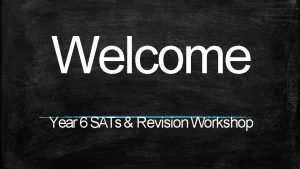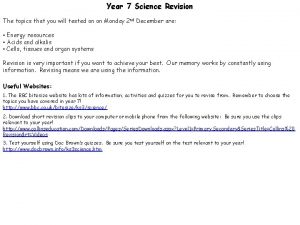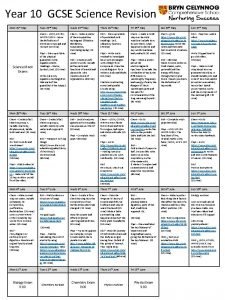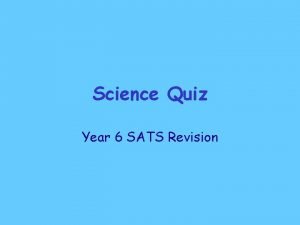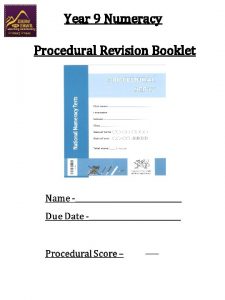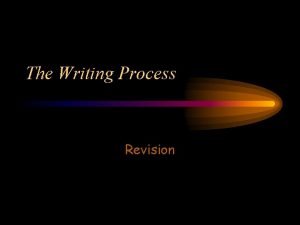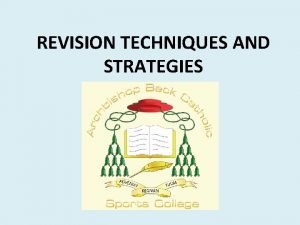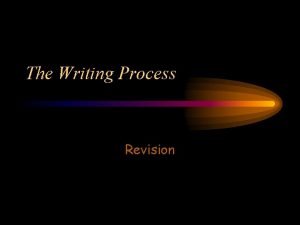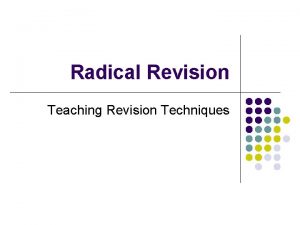Year 10 Yearly Revision Lesson 3 Todays lesson










- Slides: 10

Year 10 Yearly Revision Lesson 3

Today’s lesson • Understanding what makes a band 6 essay • Knowing common mistakes made for band 4, 5 and 3 -1.

Band 6 (18 -20) Essay Introduction • First sentence is a clear thesis statement that deliberately answers the question • Introduces text clearly • Briefly goes through points that will be made in body • High modality Body paragraph All paragraphs: • Uses clear PETAL structure for • Detailed evidence – reference to text • Thesis statement sustained and reinforced Conclusion • Reinforces thesis • Summarises argument well Structure • Ideas seperated by paragraphs • Clear intro, body, conclusion • Cohesive Expression • Formal • Sophisticated

Band 5 (16 -14) Essay Introduction • First sentence is a clear thesis statement that deliberately answers the question • Introduces text clearly • Briefly goes through points that will be made in body • High modality Body paragraph All paragraphs: • Uses clear PETAL structure • Evidence can be more detailed • Thesis statement can be reinforced more Conclusion • Thesis needs to be reinforced again • Summarises argument well Structure • Ideas seperated by paragraphs • Clear intro, body, conclusion • Cohesive Expression • Formal • Sophisticated but sometimes informal or inconsistent

Band 4 (14 -12) Essay Introduction • Thesis statement needs to be made • First sentence does not address question clearly Briefly goes through points that will be made in body • High modality Body paragraph All paragraphs: • Needs to abide more to PETAL structure • Topic sentences inconsistent • Evidence can be more detailed • Thesis statement is not reinforced Conclusion • Thesis needs to be reinforced again • Summarises argument well Structure • Ideas seperated by paragraphs • Clear intro, body, conclusion • Essay can flow more if more cohesive devices are used Expression • Sophisticated but sometimes informal or inconsistent

Band 3 (12 -10) Essay Introduction • Question needs to be addressed • No or little thesis statement Body paragraph All paragraphs: • Focuses more on retelling • Focuses more on summarising the text • Does not abide to PETAL Conclusion • Thesis needs to be reinforced again • Summarises argument well Structure • Ideas seperated by paragraphs • Cohesive Expression • Grammar, punctuation needs to be corrected

Activity • • Get into pairs You will be given a sample, with no mark Answer the 5 questions Give a mark and justify it

Sample 1 Through the main character which has an important role in this play that is “Macbeth”, was written by William Shakespeare. Interesting characters such as Macbeth and Lady Macbeth plays an important role in which helps us explore an idea that is presented in the text describing who they are and what they do. Shakespeare explores the character’s impact of ambition, guilty and power corruption in his play “Macbeth”. Through another experience of the play “Macbeth”, Shakespeare also shows that power is corruptive. The complex characterisation of Macbeth allows us to explore many perspectives of power corruption and the way it moulds and influences an individual in a way that Shakespeare wanted Macbeth to be which is power corruption. Interesting character such as Macbeth help us explore and understand the idea of power & corruption in this play. Power is allowing people to take control on many things but in this play it is the thrown. Corruption of power is similar to power however it is something brought upon by greed to obtain what one desires. In this play Macbeth is willing to get what he desires and he is going to do anything for it. Power & corruption is therefore another driving force of the play that is powerful and do whatever it takes. In Act 4 Scene 3 the quote says “A good and virtuous nature may recoil, In an imperial charge…. Angels are bright still, though the brightest fell”, which symbolises that the death of King Duncan is a big and prominent part to corruption and eventually his demise in the play. Macbeth agrees to go along with Lady Macbeth evil plan and perform a way of killing the King without him noticing it was Macbeth. By killing Duncan, Macbeth destroys the natural order of things and bring Scotland to utter chaos. It could be said that the once kind Macbeth can blame his future corruption on his wife and the 3 witches because if he didn’t know about the throne he wouldn’t be in this situation at all. This creates an idea that Macbeth is crazy and is determine to get the throne and become the next king. The power is taking over and corruption is happening badly after when King Duncan died.

Sample 2 Shakespeare uses interesting characters to help us understand the ideas presented in his texts. Macbeth is a prime example of this as the play uses its characters to convey a variety of emotions, themes and ideas to its audience. Characters such as Macbeth and Lady Macbeth display themes such as Ambition, Violence and Guilt to shape the tragic story of Macbeth. In Macbeth, ambition is presented as a dangerous quality. It causes the downfall of Macbeth and Lady Macbeth and triggers a series of deaths in Macbeth. Ambition is therefore a driving force of the play. Macbeth’s ambition is driven by a number of factors including Lady Macbeth and the prophesies. Lady Macbeth is the catalyst in encouraging Macbeth to overcome his strong sense of guilt and take action on the prophesies told by the witches. The witches prophesize that Macbeth will become king, he believes them and the various prophesies are realized throughout the play. Macbeth’s ambition soon spirals out of control and forces him to murder more and more people to cover up his wrongdoings. His first victims are the Chamberlains who are blamed and killed by Macbeth for the murder of King Duncan. Soon it is followed by Banquo’s murder once Macbeth fears that the truth could be revealed. Ambition that is accompanied by greed often comes along with consequences that deal with the wrongdoings of an individual, in the play Macbeth Is slain as a tyrant and Lady Macbeth commits suicide. Shakespeare does not give either character the opportunity to enjoy what they have achieved, perhaps to indicate that it is more satisfying to achieve your goals fairly than to achieve them through corruption and wrongdoings. At the end of the play, Malcolm claims the throne and Macbeth’s ambitious flame is extinguished. However, the audience is left wondering if Banquo’s heir will eventually become king as prophesized by the witches, will he act on his own ambition or will fate play a part in realizing the prophesy? Or were the witches’ predictions wrong? Prompting the question if the events that led to Macbeth’s downfall was just a coincidence?

Sample 3 The characters in a text are arguably the most important in terms of how well the ideas are presented. They convey emotion, portray different viewpoints, and support themes in the text. The characters can also play a vital role in highlighting the societal context and shaping the story itself. Overall, the characters in a text are essential in presenting the key ideas but also in helping the reader connect with and understand what they are presented with. In order to determine whether interesting characters help us understand the ideas presented in a text, we must first examine what exactly makes ‘an interesting character’. According to the Greek tragedy, an interesting character could very well be described as “the tragic hero”- someone who embodies the archetypal characteristics according to the conventions. A few essential elements of an interesting character include: noble stature and a tragic flaw. In the play ‘Macbeth’, the characters help to present major themes and motifs that are present in the text, such as; ambition, fate vs. freewill and guilt. Ambition is a central idea within the text and it is explored through different characters, which highlights how it can affect individuals differently. This can be seen through the characters of Macbeth and Lady Macbeth, both of whom deeply desired power and ultimately, lost all sense of their morality. Initially a nobleman loyal to his king, Macbeth desired greater power yet still had morality that ensured he wouldn’t commit any misdeeds. After hearing of the witches’ prophecy, he alerted his wife but remained free of any ill thoughts- “If chance will have me king. Why, chance may crown me/without my stir”. Lady Macbeth, on the other hand, realised it was an opportunity to gain control of the throne and appealed to the gods above to rid her of her traditional feminine ‘milk of kindness’ and asked to be “unsexed” and “filled toe top full of direst cruelty”. This led to her gaining enough strength to persuade her husband, Macbeth, into committing regicide. Macbeth has an internal struggle between seizing power and crossing a line into dark territory but ultimately disregards is own morality and commits the crime, achieving his desire for power. In accordance to Greek tragedy conventions, he is a ‘tragic hero’ due to his noble stature. However, his tragic flaw -being ambition- lead him astray. Macbeth and Lady Macbeth’s ambition was able to overcome them in such a way that they disregarded their own morality and committed such a crime against their own king, showing their corruption and greed and how powerful it proved to be.
 Active revision vs passive revision
Active revision vs passive revision Todays sabbath lesson
Todays sabbath lesson Welcome remarks for sabbath school program
Welcome remarks for sabbath school program Do we have class today
Do we have class today Year 7 spanish revision booklet
Year 7 spanish revision booklet Sats revision timetable
Sats revision timetable Year 7 science revision
Year 7 science revision French year 7 revision booklet
French year 7 revision booklet Year 10 science revision
Year 10 science revision Year 6 science revision
Year 6 science revision Year 9 maths revision booklet
Year 9 maths revision booklet





